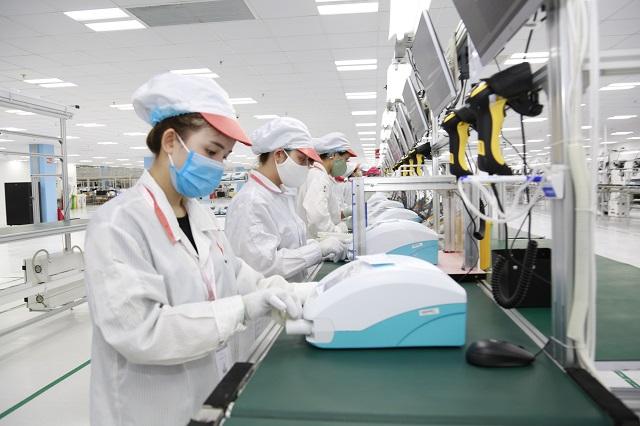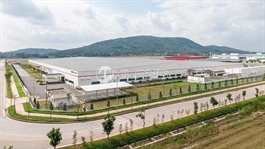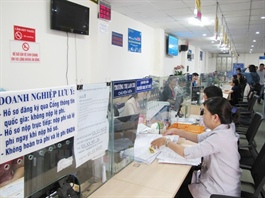Vietnam GDP growth forecast to expand at 5.8% in 2021: VEPR
Vietnam GDP growth forecast to expand at 5.8% in 2021: VEPR
The top priority at this time is ensuring social security, keeping the macroeconomic environment stable, and supporting businesses that are still in operation.
In case the Covid-19 pandemic is put under control and the global economy returns to its recovery trend, Vietnam’s economic growth in 2021 could be in range of 5.6-5.8%, lower than the government’s target of 6.5%.

Production of VSmart ventilators by Vingroup at Hoa Lac hi-tech park. Photo: Thanh Hai.
|
Vietnam Institute for Economic and Policy Research (VEPR) made the forecast in its latest Vietnam macro-economic report.
“However, in a less likely scenario, when the spread of new Covid-19 variant turns more serious, domestic economic activities could be disrupted and keep the GDP growth even at a lower rate compared to last year,” warned the VEPR.
Under a second scenario, the hospitality and catering services remain the hardest-hit sector without the return of foreign tourists and domestic demands are limited due to Covid-19 restriction.
The business community, especially the private sector, would see their resilience against Covid-19 weakened as the pandemic stays for the second year. In this circumstance, public investment would continue to be the main force for growth, and keep the GDP growth at 1.8-2%, 0.91 percentage points lower than the growth rate from last year.
Future risks
A GDP growth of 2.91% year-on-year in 2020 put Vietnam among best performing economies, mainly thanks to the government’s effective measures against the pandemic; the signing of new trade agreements (EVFTA, RCEP, UKVFTA); waves of investment movement to disperse risks from US-China trade war and take advantage of investment incentives in Vietnam; and a stable macroeconomic environment with moderate inflation, creating good conditions for the implementation of growth support policies.
However, Vietnam is also facing many risks and challenges in an unstable world economic environment, said the VEPR.
The recurrence of Covid-19 in many countries is accompanied by blockade measures could extend the disruption of the supply chain in 2021, it added, while geopolitical conflicts between large countries can put an open economy like Vietnam into a disadvantage situation.
Besides, the weakness of Vietnam's economy also comes from internal issues such as high fiscal deficit, low development investment budget; the insufficiently improved health of the banking - financial system; the heavy dependence of growth on the FDI sector; low labor quality; and the stagnated privatization process of SOEs.
Keeping macroeconomic stability stays key
From the beginning of the year to the end of September 2020, the SBV has three times lowered interest rate, the moves which have encouraged commercial banks to provide cheaper loans.
Besides, the VND250 trillion (US$11 billion) credit support package is still being deployed by commercial banks.
“However, the room remained limited to Vietnam to maneuver its policies to such extend for this year, resulting in limited impacts on economic development and protection of social welfare,” stated VEPR’s report.
Due to limited fiscal resources after years of budget deficit, coupled with monetary policy bound to inflation and exchange rate targets, Vietnam cannot pursue macro policies in a similar manner to other countries in the world, namely a large-scale monetary easing, stated the VEPR.
In addition, the Covid-19 pandemic prevention and social security subsidies are also putting great pressure on the state budget.
“The top priority at this time is ensuring social security, keeping the macroeconomic environment stable, and supporting businesses that are still in operation,” suggested the VEPR.
Social security policies still need to be a top priority and need to be implemented quickly, towards the right people, it urged. In particular, the policy implementation needs to pay more attention to workers in the informal sector, those are severely affected by the pandemic and faces many difficulties to access supportive policies.
Meanwhile, the policies to support businesses also need to continue to be quickly implemented, well-targeted to the right subject, closely following the needs of businesses.
The freezing/suspension, exemption or reduction of financial costs for businesses such as loan interest, land rental should continue to be implemented, besides, it is necessary reduce all possible burdens for businesses, said the VEPR.
Even if the pandemic is fully under control domestically, many export-oriented manufacturing and services sectors may face long-term difficulties as Covid-19 has not completely been contained worldwide.
“Therefore, promoting public investment should remain a key measure to support economic growth,” said the report.
In all situations, inflation, interest rates, and exchange rates need to be maintained stably, securing the foundation for economic recovery after the pandemic.
The VEPR suggested the necessity to diversify export/import markets to avoid heavy dependence on some major economic partners.
As Vietnam is looking to move on from the pandemic, VEPR suggested the country should gradually build a fiscal buffer to prevent future shocks.





















